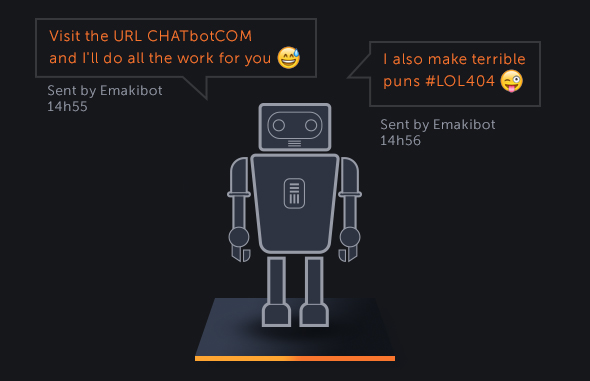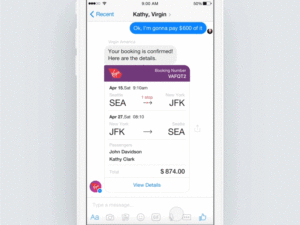Agencies and The Chatbot Challenge
The smartphone has become the technological tool we depend on most in our everyday lives: it allows us to find (and find again) information we need, entertain ourselves, remind us what we are supposed to be doing, calculate our sporting progress, and remotely control connected objects or domestic applications. Of course, we also use it to communicate with our families, colleagues and customers.
But if there is one feature offered by our telephone that we use less and less, it is one that allows…calling! Unless it is absolutely necessary, a call is not the first option that comes to mind when communicating. Professional life calls for an email, the time of a family union is organised via SMS, friends share information or amuse each other in a WhatsApp group, and you feel constantly close to a loved one who lives abroad thanks to Facebook Messenger. In short, we use our phones more and more, but less and less to call.
No more calls and no more apps, PLEASE!
So why on earth, in 2016, would you go through a call centre to book a plane ticket, make an appointment to see a mechanic at a garage or complain about the quality of service from your phone company? More and more entrepreneurs are starting to understand this change in behaviour and want to offer a modern alternative to sales and after-sales service. This takes account of ‘fully mobile’ life where users are reluctant to install new applications on their smartphone or visit a website, even if it is a mobile one.

These are some of the reasons to explain the growing use of messaging applications to communicate with brands. And this isn’t about Community Management either. No, this is about chatbots, or conversational agents, software programmed to respond just like employees in shops to a customer’s demands. Thanks to artificial intelligence, the chatbot identifies the intentions and needs of customers to sell them their desired product or service, through conversations on Facebook Messenger, WhatsApp, Skype, Google Allo & Hangout, Apple Message, Slack, Telegram, Kik, Line, WeChat, KakaoTalk and others. The airline company KLM already offers its customers this service: tell KLM your Messenger id when buying a ticket and the KLM chatbot will send your boarding pass, notifications and reminders via Messenger.
If this concept convinces a generation or more that calling isn’t an option, could it even go as far as to revolutionize the relationship between brands and their customers? Is there a market for digital agencies in developing these conversational agents? Companies may be tempted to develop such chatbots internally, using tools provided by the usual suspects such as IBM or a multitude of startups (Meya.ai, Wit.ai, API.ai, and Luis.ai, to name a few). And giants like Facebook, Apple, Google, Microsoft and Amazon all have a finger in the pie: whether it’s using Messenger to chat, or Siri, Google Assistant, Now, Cortana or Echo, nobody wants to miss this market.

Is it worth it?
If agencies decide to join the dance, they may be tempted to develop tools to manage the most popular messaging services through a single interface for their customers. They can then develop skills to take charge of the technical development of these chatbots, and also design the vital scripts and write the copy for interactions between users and conversational agents. That’s the gamble, perhaps a risk, faced by agencies: should they position themselves as pioneers in an emerging but uncertain market, or run the risk of having to jump on a moving train? Those who choose the latter option may need to order their train tickets via the chatbot developed by agencies who took their seats at the start…
Our recent blog posts
See all blogs-
How is AI’s synthetic data enhancing User Experience Research? Technology

-
Web3.AI Rising : How new technology can add value to your business

-
How generative AI helped us create an e-commerce app – with personalised content – in just 2 weeks Technology

-
Can you build a foodie app in 3 days using Generative AI? (Spoiler alert: yes!)


